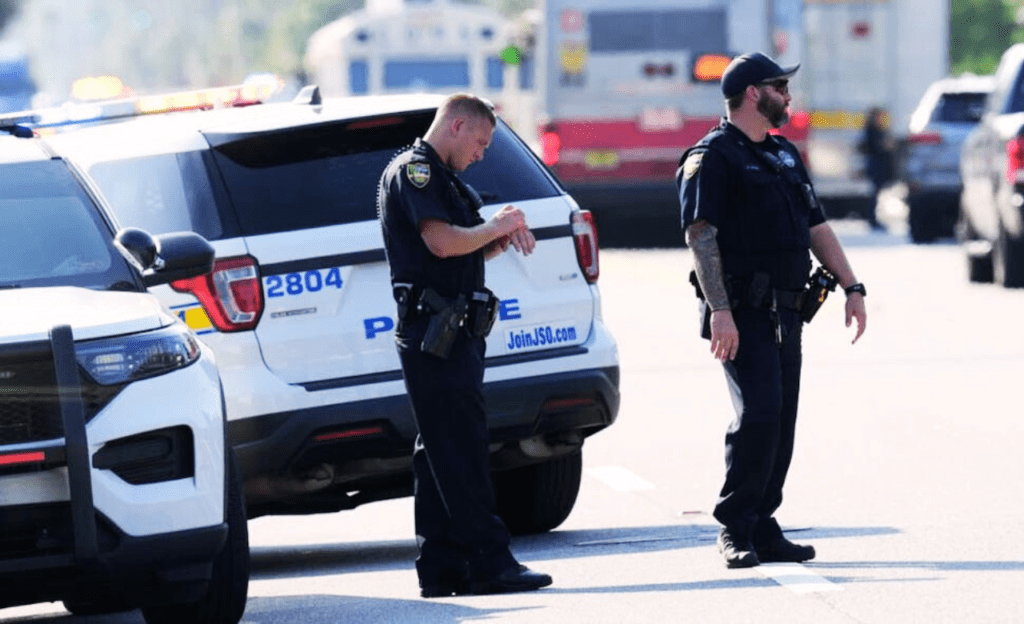
3 Killed in Jacksonville Dollar General Shooting: Recap of the Tragic Incident
In a horrifying incident that shook the city of Jacksonville, Florida, a white gunman unleashed a hate-motivated attack that claimed the lives of three innocent Black individuals. This tragic shooting took place at a Dollar General retailer, leaving the community in shock and mourning. The shooter’s racial hatred and intentions to harm Black people were evident, as he targeted them specifically during the attack. This article delves into the details of the incident, shedding light on the shooter’s motives, the response from law enforcement, and the broader implications of such a heinous act.
Table of Contents
The Jacksonville Shooter’s Hate-Fueled Attack
The assailant, a young man in his early 20s, donned a tactical vest and was armed with both an AR-style rifle and a Glock handgun. What’s particularly chilling about this attack is that the shooter had etched swastikas onto his firearms, underscoring the depth of his hatred. Sheriff T.K. Waters confirmed in a news conference that the shooter’s actions were driven by racial animosity, stating unequivocally that the shooter despised Black people and harbored intentions to kill them.
The Motive Behind the Attack
According to Sheriff Waters, the shooter left behind messages intended for his parents, the media, and federal law enforcement. These messages painted a disturbing picture of his mindset, as he detailed his racial hatred and the specific group he aimed to target — Black people. The shooter’s intent to take lives was described by Waters as the actions of a “maniac,” someone who had chosen to victimize an entire community solely based on their race.
A Community in Danger
The tragedy unfolded in a Dollar General store, where Black shoppers were going about their day, completely unaware of the danger that awaited them. The sheriff’s statement that “any member of that race at that time was in danger” underscores the level of threat that the Black community faced during this attack. This incident serves as a stark reminder of the racial bias and hatred that continue to persist in society, leading to senseless acts of violence against innocent individuals.
Law Enforcement Response and Investigation
In response to the attack, the FBI swiftly initiated a federal civil rights investigation into the incident. The shooting is being treated as a hate crime, underscoring the recognition that the shooter’s motives were rooted in racial animus. This response is crucial not only for bringing the perpetrator to justice but also for sending a clear message that such acts of hate will not be tolerated in society.
Timing and Symbolism
The timing of this tragic event holds additional significance. The shooting took place just two days before the 60th anniversary of the March on Washington for Jobs and Freedom, a historical event that aimed to promote civil rights and equality. The shooter’s actions stand in stark contrast to the principles of unity and justice that the march sought to uphold. Additionally, the incident occurred on the same day that thousands gathered to commemorate the anniversary in a march held in the nation’s capital.
A Disturbing Anniversary
The incident is further marked by its proximity to the five-year anniversary of a mass shooting that occurred at a video gaming event in Jacksonville. This grim coincidence highlights the persistence of gun violence in the region and underscores the urgent need for measures to prevent such tragedies from recurring.
The AR-Style Rifle: A Familiar Weapon
The shooter’s choice of an AR-style rifle, commonly associated with mass shootings, raises concerns about the availability of firearms that can cause such devastating harm. The AR-15, known for its high rate of fire and destructive capabilities, has been used in various mass shootings across the country. This underscores the ongoing debate around gun control and the need for comprehensive measures to prevent such weapons from falling into the wrong hands.
Florida Governor Ron DeSantis Condemns Racially Motivated Shooting: An In-depth Analysis

In a tragic incident that shook the community, a racially motivated shooting occurred, leading to the loss of lives and immense grief. Florida Governor and presidential candidate Ron DeSantis, who was campaigning in Iowa at the time, expressed his condemnation of the heinous act. His words hold significance as he addresses the situation with authority, empathy, and a firm commitment to justice.
The Manifesto and Racial Motivation
Florida Governor Ron DeSantis responded promptly to the news of the shooting, acknowledging that the crime was driven by a disturbing manifesto. The manifesto, authored by the individual responsible for the attack, revealed a troubling ideology rooted in hatred. Governor DeSantis categorically labeled the shooting as racially motivated, denouncing it in the strongest possible terms. This incident brings attention to the prevalence of hate-driven crimes in society and underscores the importance of addressing such issues on both local and national levels.
Accepting Responsibility: Facing the Music
Governor DeSantis criticized the shooter’s decision to take his own life rather than face the consequences of his actions. The shooter’s decision to evade responsibility by ending his life was referred to as the “coward’s way out.” Governor DeSantis expressed that true accountability lies in facing the consequences of one’s actions, even in the face of grave mistakes. This sentiment resonates with a society that values accountability, justice, and the courage to confront one’s actions.
Condolences and Empathy
In the wake of the tragic incident, Governor DeSantis extended heartfelt condolences to the families who lost their loved ones. His expression of sympathy acknowledges the pain and suffering experienced by those directly affected. This empathetic response reinforces his commitment to standing with the community during times of adversity, demonstrating leadership that goes beyond political boundaries.
Community and Law Enforcement Interactions
The shooter, who hailed from nearby Clay County, had a history of interactions with law enforcement. In 2016, he was involved in a domestic disturbance call, which did not result in any arrests. In 2017, he was placed under the Baker Act, a Florida court system provision that allows for temporary detention and mental health examination when an individual is deemed a potential threat to themselves or others due to mental instability. This history raises questions about the effectiveness of existing measures to prevent such incidents and the need for improved mental health support and intervention.
Swift Action and Tragic Outcome
The shooter’s actions unfolded rapidly on the day of the incident. Leaving Clay County in the morning, he arrived in Jacksonville and began a series of violent acts, culminating in the shooting at a Dollar General store. The shooter’s family contacted the Clay County Sheriff’s Office during the course of his actions, but by then, the tragedy had already unfolded. The swiftness of the events underscores the importance of effective communication and response protocols in crisis situations.
Acting Alone: Ideology of Hate
Contrary to initial speculations, law enforcement confirmed that the shooter acted alone, with no evidence of his affiliation with any group. The ideology of hate present in the shooter’s manifesto was condemned by both authorities and community members. This incident serves as a reminder of the dangers posed by extremist ideologies and the importance of fostering inclusive and tolerant communities.
craigslist jacksonville nc
The nearby Edward Waters University, a historically Black college, issued a “stay in place” order for its campus as a precautionary measure. Authorities conducted thorough checks of the campus facilities to ensure the safety of students and staff. The incident raised concerns about campus safety protocols and the need for educational institutions to be prepared for emergencies.
FAQ
Q: What were the shooter’s motives behind the attack?
A: The shooter’s motives were driven by racial hatred and animosity towards Black people.
Q: How did law enforcement respond to the shooting?
A: The FBI initiated a federal civil rights investigation into the incident, treating it as a hate crime.
Q: What is the significance of the timing of the incident?
A: The shooting occurred just days before the 60th anniversary of the March on Washington for Jobs and Freedom, highlighting the contrast between the shooter’s actions and the principles of unity.
Q: Why is the choice of firearm significant in this incident?
A: The shooter’s use of an AR-style rifle highlights the ongoing debate about gun control and the need to address the accessibility of such weapons.
Q: What impact did the shooting have on the community?
A: The shooting left the community in shock and mourning, emphasizing the need to address racial bias and hate.
Q: Has the shooter been identified?
A: Law enforcement officials have not yet identified the shooter, who was in his early 20s.
Q: What was Governor DeSantis’ response to the racially motivated shooting?
Governor DeSantis strongly condemned the shooting, emphasizing that it was driven by a racially motivated manifesto. He extended his condolences to the affected families and expressed his commitment to condemning such acts of violence.
Q: What did Governor DeSantis say about the shooter’s decision to take his own life?
Governor DeSantis criticized the shooter’s choice to evade responsibility by ending his own life. He referred to it as the “coward’s way out” and stressed the importance of accountability for one’s actions.
Q: What was the shooter’s history with law enforcement?
The shooter had previous interactions with law enforcement, including a domestic disturbance call in 2016 and placement under the Baker Act in 2017 due to mental health concerns.
Q: How swiftly did the tragic events unfold on the day of the incident?
The shooter’s actions unfolded rapidly, from leaving Clay County in the morning to engaging in violent acts in Jacksonville, culminating in the shooting at a Dollar General store.
Q: Was the shooter affiliated with any extremist group?
Law enforcement confirmed that the shooter acted alone and was not part of any group. His ideology of hate, as revealed in his manifesto, was condemned by authorities and the community.
Q: How did Edward Waters University respond to the incident?
The historically Black college issued a “stay in place” order for its campus and conducted checks of its facilities to ensure safety. This incident highlighted the need for preparedness and safety measures on educational campuses.
Conclusion
The tragic shooting at the Dollar General store in Jacksonville serves as a somber reminder of the persistence of racial hatred and bias in society. The assailant’s deliberate targeting of Black individuals and the symbols of hate on his firearms underscore the urgent need for efforts to combat such sentiments. As the community mourns the loss of three innocent lives, it is imperative that we come together to address the root causes of such heinous acts and work towards building a more inclusive and just society.





